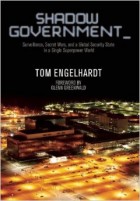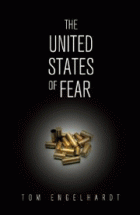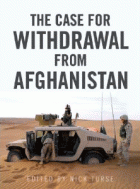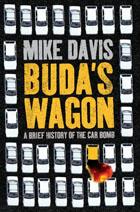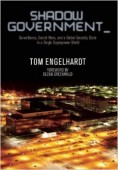“Bring the war home”: once, a long, lost time ago -- in October 1969, to be exact -- that slogan represented a promise made by the most radical wing of the vast movement against the war in Vietnam. Wearing football helmets and wielding lead pipes, that tiny crew of extreme leftists carried out what they termed the “Days of Rage” in Chicago, smashing cars and store windows in an attempt to give Americans a small sense of what war felt like, of what their military had delivered to the Vietnamese. Those radicals, who came to be known as Weathermen (in honor of Bob Dylan’s line “You don’t need a weatherman to know which way the wind blows”), would later graduate to the bombing of a Pentagon bathroom, a bathroom on the Senate side of the Capitol, and themselves.
Just in case you haven't caught on yet, in bringing up that ancient slogan and that long forgotten group, I’m heading directly for irony in the world of 2017. So consider yourself warned because, as far as I can see, the dream of the Weathermen has, in some strange fashion, been fulfilled in twenty-first-century America by... the U.S. military. Unlike in the Vietnam era, the U.S. has been fighting its unsuccessful post-9/11 wars for 16 years in distant lands with barely a trace of an antiwar movement to show for it. The last significant protests in the streets of America camemore than a decade ago, and this country -- mass murders like the one in Las Vegas aside -- has remained remarkably peaceful and eerily unconcerned about the wars being fought in its name. And yet in that strange vacuum, those distant wars have been brought home in a host of ways.
I was struck by this on a recent trip to Santa Fe during which I set off one of those airport metal detectors and promptly had my hands swabbed and tested for explosive residue. Obviously, we all now live in a strikingly more militarized and securitized world. Who in twenty-first-century America hasn’t been wanded (something unheard of in the Vietnam era)? Who hasn’t felt the riseof the national security state up close and personal in a country in which military drones are in the air, our borderlands have been turned into fortresses, military-style surveillance is a way of life, taxpayer dollars pour into the Pentagon and the Department of Homeland Security, and sports events are a riot of militarized activities (paid for by the Pentagon)? And of course, the secretary of defense, the national security advisor, and the White House chief of staff, arguably the three most powerful figures in Washington other than the president himself, are generals from America’s losing wars. Though no one seems to notice, these truly could be considered our days of rage.
Today, U.S. Army Major Danny Sjursen, TomDispatch regular and author of Ghost Riders of Baghdad: Soldiers, Civilians, and the Myth of the Surge, focuses on one striking way in which our wars have indeed come home, via the militarization of the police and police practices nationwide. This country, as he says (from his own experiences in those wars), is being “Baghdadified.” Tom
The Empire Comes Home
Counterinsurgency, Policing, and the Militarization of America’s Cities
By Danny Sjursen“This... thing, [the War on Drugs] this ain't police work... I mean, you call something a war and pretty soon everybody gonna be running around acting like warriors... running around on a damn crusade, storming corners, slapping on cuffs, racking up body counts... pretty soon, damn near everybody on every corner is your f**king enemy. And soon the neighborhood that you're supposed to be policing, that's just occupied territory.” -- Major "Bunny" Colvin, season three of HBO’s The Wire
I can remember both so well.
2006: my first raid in South Baghdad. 2014: watching on YouTube as a New York police officer asphyxiated -- murdered -- Eric Garner for allegedly selling loose cigarettes on a Staten Island street corner not five miles from my old apartment. Both events shocked the conscience.
It was 11 years ago next month: my first patrol of the war and we were still learning the ropes from the army unit we were replacing. Unit swaps are tricky, dangerous times. In Army lexicon, they’re known as “right-seat-left-seat rides.” Picture a car. When you’re learning to drive, you first sit in the passenger seat and observe. Only then do you occupy the driver’s seat. That was Iraq, as units like ours rotated in and out via an annual revolving door of sorts. Officers from incoming units like mine were forced to learn the terrain, identify the key powerbrokers in our assigned area, and sort out the most effective tactics in the two weeks before the experienced officers departed. It was a stressful time.
I’m sure you’ve heard about the $65 million. Or was it $86 million? Or was it even more? You know, the funds the Pentagon sunk into that hotshot plane it was preparing for its Afghan drug interdiction program. You haven’t?
Well, as Megan Rose reported at ProPublica, with its “electro-optical infra-red video capacity,” that counternarcotics plane was supposed to lend a significant hand in surveilling and disrupting the Afghan heroin trade. Only one small problem. That single plane never made it out of a warehouse in Delaware or flew a mission in Afghanistan, whatever its cost (which the Pentagon was typically incapable of tracking), and when it was recently offered for sale at auction, no one wanted to put down a red cent for it. And lest you think of that as a bizarre anomaly, consider, as Rose points out, the $3 million patrol boats for Afghanistan the Navy purchased that never made it out of Virginia or the 20 planes for the Afghan air force that the Pentagon spent a mere $486 million on, even though they never flew and finally brought in just $32,000 as scrap metal. Or think for a moment about the more than $65 billion (yep, billion!) that went into the woefulAfghan military, an inept force long mentored by the U.S. military that remains filled with “ghost soldiers” and plagued by soaring casualties and staggering desertion rates. Or since America’s war zones have, in these years, been sinkholes of corruption, just recall the $43 million gas station built by the Pentagon in the middle of an Afghan nowhere, or the similarly infamous “highway to nowhere,” or the state-of-the-art U.S. military headquarters in Helmand Province, Afghanistan, that doubled in cost to $25 million while under construction and was never used, or the $1.2 billion to $1.6 billion in cash that was somehow stolen from the U.S. in Iraq, which itself was just a drop in the bucket, given the $60 billion lost to waste and fraud in that particular morass of a war zone. And mind you, that’s just to start down a list of catastrophic “investments” in this country's wars.
If you consider them in this fashion, don’t they start to seem like gigantic scam operations? Yet, as TomDispatch regular William Hartung often makes clear at this site, all of that’s just icing on the cake. The real zone of corruption doesn’t lie in Afghanistan or Iraq but in a five-sided building in Virginia, just across the Potomac River from Washington, D.C., where, as Hartung explains today, American taxpayer dollars disappear regularly into the coffers of various giant weapons-makers or into the pockets of their CEOs and top officials. War, it turns out, is the ultimate domestic scam and your tax dollars are its heart and soul. Worse yet, in a Washington endlessly riven by conflict, by the inability of more or less anyone to agree on anything, there is but one true bipartisan subject: the Pentagon. Into it, the representatives of both embattled parties couldn’t be happier or more eager to pour yet more money.
In normal terms, 16 years later, the war on terror should be seen as a disaster, but as Hartung explains, in terms of funding the Pentagon (and the crew of warrior corporations that are its heart and soul), it has been a sterling financial success story from 9/12 on. Tom
The Scandal of Pentagon Spending
Your Tax Dollars Support Troops of Defense Contractor CEOs
By William D. HartungHere’s a question for you: How do you spell boondoggle?
The answer (in case you didn’t already know): P-e-n-t-a-g-o-n.
Hawks on Capitol Hill and in the U.S. military routinely justify increases in the Defense Department's already munificent budget by arguing that yet more money is needed to “support the troops.” If you’re already nodding in agreement, let me explain just where a huge chunk of the Pentagon budget -- hundreds of billions of dollars -- really goes. Keep in mind that it’s your money we’re talking about.
The answer couldn’t be more straightforward: it goes directly to private corporations and much of it is then wasted on useless overhead, fat executive salaries, and startling (yet commonplace) cost overruns on weapons systems and other military hardware that, in the end, won’t even perform as promised. Too often the result isweapons that aren’t needed at prices we can’t afford. If anyone truly wanted to help the troops, loosening the corporate grip on the Pentagon budget would be an excellent place to start.
The numbers are staggering. In fiscal year 2016, the Pentagon issued $304 billionin contract awards to corporations -- nearly half of the department’s $600 billion-plus budget for that year. And keep in mind that not all contractors are created equal. According to the Federal Procurement Data System’s top 100 contractors report for 2016, the biggest beneficiaries by a country mile were Lockheed Martin ($36.2 billion), Boeing ($24.3 billion), Raytheon ($12.8 billion), General Dynamics ($12.7 billion), and Northrop Grumman ($10.7 billion). Together, these five firms gobbled up nearly $100 billion of your tax dollars, about one-third of all the Pentagon's contract awards in 2016.
Even though the article was buried at the bottom of page eight of the September 28th New York Times, it caught my attention. Its headline: “Russia Destroys Chemical Weapons and Faults U.S. for Not Doing So.” In a televised ceremony, wrote reporter Andrew Higgins, Russian President Vladimir Putin “presided over the destruction of his country’s last declared chemical weapons on Wednesday.” The U.S. and Russia had, it seems, long ago agreed to do so by 2007, before pushing the date back to 2012, and then 2020. The Russians have now beaten that deadline by three years while, according to an unnamed State Department official quoted by Higgins, the U.S. “remains committed” to doing the same by... “the end of 2023.”
But I digress. One line -- actually one word -- in his story struck me oddly. The “carefully choreographed” Russian event, Higgins commented, “seemed designed to offset the reputation [Putin] has acquired for belligerence and the flouting of international norms amid Russia’s military interventions in Ukraine in 2014 and in Syria.” Yes, it was the most tepid word in that passage which caught my eye: interventions. Such a mild way to describe what the Russians did in Ukraine, but when it came to Syria, something else entirely occurred to me: like Russia, the U.S. is deeply involved in Syria; like Russia, it has troops in rising numbers there; like Russia, it has loosed its air force on that country, dropping staggering numbers of bombs regularly.
In any normal week of news, however, you can generally search in vain for a discussion here of Washington’s “intervention” in Syria. Officially, the U.S. military is conducting “overseas contingency operations” there and they are meant (unlike Russian efforts, of course) to stabilize that country. But in these years you could search, largely without success, for any labels, however tepid, being applied to what the U.S. is actually doing across the Greater Middle East and Africa. Take the recent decision to send thousands more U.S. troops to Afghanistan. Is that part of America’s “Afghan intervention”? Evidently not. Yes, we “invaded” in 2001, but what exactly are we doing now? The upping of the ante in Somalia in the Trump era -- does that qualify as part of an ongoing “Somali intervention”? If so, you won’t find out about it from your local news reports. The recent bombing of an ISIS training camp in Libya, not even officially considered “an area of active hostilities,” was the first such attack of the Trump era (but hardly the first of recent years). Is that part of Washington’s ongoing “Libyan intervention”? I doubt it. The nine-month air campaign against Iraq’s second largest city, Mosul, that left much of that historic area a pile of rubble -- is that part of our “Iraqi intervention” 14 years after the invasion of that country? Not as far as I can tell. Were the increasing numbers of bombs dropped on Yemen and the heightened special operations raids there in the early months of the Trump administration part of our ongoing “Yemeni intervention”? It's not a description I've seen anywhere.
Sixteen years after the 9/11 attacks, our never-ending wars and conflicts continue under the rubric of “the war on terror” (no caps), as terror groups spread and destabilization creeps from one of our war zones to the next. But have you noticed just how nameless, how without descriptors of any sort, such ongoing events are? TomDispatch regular Andrew Bacevich, author of America’s War for the Greater Middle East, certainly has and today he explores why those never-ending whatevers have had so little impact in this country. After all, if anyone were paying much attention, how could the generals of our losing overseas contingency operations have gained such power and prestige in Donald Trump’s Washington? Tom
Autopilot Wars
Sixteen Years, But Who’s Counting?
By Andrew J. BacevichConsider, if you will, these two indisputable facts. First, the United States is today more or less permanently engaged in hostilities in not one faraway place, but at least seven. Second, the vast majority of the American people could not care less.
Nor can it be said that we don’t care because we don’t know. True, government authorities withhold certain aspects of ongoing military operations or release only details that they find convenient. Yet information describing what U.S. forces are doing (and where) is readily available, even if buried in recent months by barrages of presidential tweets. Here, for anyone interested, are press releases issued by United States Central Command for just one recent week:
September 19: Military airstrikes continue against ISIS terrorists in Syria and Iraq
September 20: Military airstrikes continue against ISIS terrorists in Syria and Iraq
Iraqi Security Forces begin Hawijah offensive
September 21: Military airstrikes continue against ISIS terrorists in Syria and Iraq
September 22: Military airstrikes continue against ISIS terrorists in Syria and Iraq
September 23: Military airstrikes continue against ISIS terrorists in Syria and Iraq
Operation Inherent Resolve Casualty
September 25: Military airstrikes continue against ISIS terrorists in Syria and Iraq
September 26: Military airstrikes continue against ISIS terrorists in Syria and Iraq
Ever since the United States launched its war on terror, oceans of military press releases have poured forth. And those are just for starters. To provide updates on the U.S. military’s various ongoing campaigns, generals, admirals, and high-ranking defense officials regularly testify before congressional committees or brief members of the press. From the field, journalists offer updates that fill in at least some of the details -- on civilian casualties, for example -- that government authorities prefer not to disclose. Contributors to newspaper op-ed pages and “experts” booked by network and cable TV news shows, including passels of retired military officers, provide analysis. Trailing behind come books and documentaries that put things in a broader perspective.
But here’s the truth of it. None of it matters.
We tend to think of them as separate and distinct wars: the war in Afghanistan, the war in Iraq. Yet it’s not hard to trace the ways in which America’s knee-jerk overreaction to the terrorist attack of 9/11 and the “preemptive” invasion of Iraq that followed in 2003 destabilized whole regions, spreading conflict like the plague. One war begot another, often right next door, just as the war in Iraq seemed to spill into neighboring Syria and set off its demolition, too. The infamous “surge” of more than 20,000 additional U.S. troops into Iraq in 2007 only accelerated the flight of Iraqis from their homes: more than a million of them were displaced within that country, while close to a million more crossed the border into Syria.
Those Iraqi refugees generally had more money than their Syrian counterparts. With their arrival, schools and hospitals became overcrowded, food prices in Damascus rose 30% and rents 150%. Hard-pressed Syrians moved to run-down neighborhoods in Damascus, finding themselves second-class citizens in their own capital. As the number of refugees only increased, UNHCR, the U.N. Refugee Agency, found itself desperately overstretched, with money enough to help only with housing or food, not both. Poor Iraqi widows and single mothers eventually slid into the sex trade. Women danced in nightclubs where impoverished mothers sold their little girls into one-night “marriages” to high-rolling tourists from the Gulf states. And things only got worse. Such misery is contagious.
Syrian President Bashar al-Assad, having opened borders to Iraqis, feared the subversion of his own regime. He had always run a tight ship, much like his fallen autocratic neighbor Saddam Hussein. With the surge of Iraqis into Damascus, he doubled down. When I worked in the city in 2008, you could smell surveillance in the air. The same guy lounging in different neighborhoods. The lock picked. Papers rifled. A camera gone. The rising sense of something worse about to happen. The shadow of the war in Iraq fell across Damascus like a prediction. Less than three years later, in March 2011, peaceful protests began after 15 young boys were arrested and tortured -- a 13 year-old died -- for having written graffiti in support of the Arab Spring. Assad responded with deadly force and, by July, civil war was underway. To date, at least 465,000 Syrians have been killed, one million injured, and 12 million -- half the country’s population -- displaced like the Iraqis before them.
As for the U.S.: in 2016, we dropped 12,192 bombs on Syria although we are not officially at war with that country. That’s more than the 12,095 bombs we dropped that same year on Iraq, with which we are no longer at war, and more than we have dropped on any country since the war in Vietnam. It’s all about the unlimited license the war on terror has given the U.S. military. We now bomb “terrorists” wherever we “see” them (often among civilians), and currently not just in Syria and Iraq but also in Afghanistan, Yemen, Pakistan, Libya, and Somalia. Donald Trump, during his first six months in office, set an all-time presidential record, dropping 20,650 bombs on seven Muslim countries for reasons he did not explain, even as he nearly doubled the number of civilians being killed. And he’s just getting started.
TomDispatch managing editor Nick Turse brings us back to ground level today, as he writes about the courageous unsung local people, the “fixers,” who make possible the faraway work of journalists like him and the prize-winning Canadian reporter Deborah Campbell whose extraordinary new book he discusses. Full disclosure: I’m a colleague and friend of both Nick and Campbell, whose riveting book takes you deep into the eerie police state that was Damascus before the bombs began to fall in Syria. Ann Jones
The Journalist and the Fixer
Who Makes the Story Possible?
By Nick TurseWe were already roaring down the road when the young man called to me over his shoulder. There was a woman seated between us on the motorbike and with the distance, his accent, the rushing air, and the engine noise, it took a moment for me to decipher what he had just said: We might have enough gas to get to Bamurye and back.
I had spent the previous hour attempting to convince someone to take me on this ride while simultaneously weighing the ethics of the expedition, putting together a makeshift security plan, and negotiating a price. Other motorbike drivers warned that it would be a one-way trip. “If you go, you don’t come back,” more than one of them told me. I insisted we turn around immediately.
Once, I believed journalists roamed the world reporting stories on their own. Presumably, somebody edited the articles, but a lone byline meant that the foreign correspondent was the sole author of the reporting. Then I became a journalist and quickly learned the truth. Foreign correspondents are almost never alone in our work. We’re almost always dependent on locals, often many of them, if we want to have any hope of getting the story. It was never truer for me than on that day when I was attempting to cover an ongoing ethnic cleansing campaign in South Sudan.
[Note for TomDispatch Readers: It will be no news to TomDispatch readers that Noam Chomsky, soon to turn 89, is one of the wonders of our otherwise somewhat less than wondrous American world. He has a new book of interviews coming out in early December, his 11th with David Barsamian, and who wouldn’t want it? If you happen to be an Amazon shopper, you can pre-order Global Discontents: Conversations on the Rising Threats to Democracy by clicking on this link and, in the process, you’ll even contribute a few cents to TD’s coffers at not a penny’s cost to you. So check out today’s post from that book and then hustle to secure a copy for yourself. Tom]
I first “met” Noam Chomsky in 1969 by reading these words of his about the My Lai massacre:
“And now there is Song My -- ‘Pinkville.’ More than two decades of indoctrination and counterrevolutionary interventions have created the possibility of a name like ‘Pinkville’ -- and the acts that may be done in a place so named. Orville and Jonathan Schell have pointed out what any literate person should realize, that this was no isolated atrocity but the logical consequence of a virtual war of extermination directed against helpless peasants: ‘enemies,’ ‘reds,’ ‘dinks.’”
Discussing various of America’s criminal acts in the larger war in Vietnam, Chomsky then added of the My Lai massacre itself:
“It is perhaps remarkable that none of this appears to occasion much concern. It is only the acts of a company of half-crazed GIs that are regarded as a scandal, a disgrace to America. It will, indeed, be a still greater national scandal -- if we assume that to be possible -- if they alone are subjected to criminal prosecution, but not those who have created and accepted the long-term atrocity to which they contributed one detail -- merely a few hundred more murdered Vietnamese.”
Chomsky wrote “After Pinkville” -- areas like Song My were then colored pink on American military maps -- in 1969. Almost half a century later, the question is: Have things improved? After all, in Ken Burns’s new Vietnam extravaganza, his 18-hour documentary on that war, he seems to have captured the zeitgeist of the moment by carefully changing the word “murder” in the script for the My Lai episode to “killing.” “At lunch, Burns defended his change," wrote the New Yorker’s Ian Parker,"on the ground that My Lai continues to have ‘a toxic, radioactive effect’ on opinion. ‘Killing’ was the better word, he said, ‘even though My Lai is murder.’” To be thoroughly upbeat, perhaps by 2067 Americans will finally be able to take “murder” straight on television when it comes to My Lai.
Almost 50 years ago, Daniel Ellsberg was both celebrated by many and unsuccessfully prosecuted by the Nixon administration, in part under the Espionage Act, for releasing The Pentagon Papers, a massive secret trove of documents that revealed to the American people something of what the United States was actually doing in Vietnam. In our era, Chelsea Manning did something similar. She turned over a twenty-first-century trove of secret documents on the Afghan and Iraq wars -- on, that is, what she’s accurately termed “death, destruction, and mayhem” -- to WikiLeaks and for that she was celebrated by few and prosecuted and convicted by the U.S. military. Pardoned by President Obama after seven years in military prison, she recently had her visiting fellowship to Harvard’s Institute of Politics at the Kennedy School of Government rescinded after CIA Director Mike Pompeo cancelled a talk there, complaining that Manning had “betrayed her country,” and former CIA Acting Director Michael Morell, a senior fellow at the same school, resigned in protest. Or to put it another way, Harvard caved to men who represented an agency that had committed secret acts of horror betraying every imaginable American value. (To give credit where it’s due, significant numbers of Harvard faculty members protested this craven act.) The same institute felt no compunctions about offering a visiting fellowship to former Trump press secretary Sean Spicer and, despite alumni protest, not rescinding it. Perhaps there’s an essay, “After Punkville,” to be written about all of this.
Under the circumstances, it’s our good fortune that, with civilians regularly being “killed” by U.S. firepower across the Greater Middle East, Noam Chomsky continues to remind us what our world really looks like if we don’t censor either our language or our thoughts. It makes today’s TomDispatch post, a recent interview from his upcoming book with David Barsamian, Global Discontents: Conversations on the Rising Threats to Democracy, particularly relevant to our moment. Tom
The Trump Presidency
Or How to Further Enrich “The Masters of the Universe”
By Noam Chomsky and David Barsamian[This interview has been excerpted from Global Discontents: Conversations on the Rising Threats to Democracy, the new book by Noam Chomsky and David Barsamian to be published this December.]
David Barsamian: You have spoken about the difference between Trump’s buffoonery, which gets endlessly covered by the media, and the actual policies he is striving to enact, which receive less attention. Do you think he has any coherent economic, political, or international policy goals? What has Trump actually managed to accomplish in his first months in office?
Noam Chomsky: There is a diversionary process under way, perhaps just a natural result of the propensities of the figure at center stage and those doing the work behind the curtains.
At one level, Trump’s antics ensure that attention is focused on him, and it makes little difference how. Who even remembers the charge that millions of illegal immigrants voted for Clinton, depriving the pathetic little man of his Grand Victory? Or the accusation that Obama had wiretapped Trump Tower? The claims themselves don’t really matter. It’s enough that attention is diverted from what is happening in the background. There, out of the spotlight, the most savage fringe of the Republican Party is carefully advancing policies designed to enrich their true constituency: the Constituency of private power and wealth, “the masters of mankind,” to borrow Adam Smith’s phrase.
These policies will harm the irrelevant general population and devastate future generations, but that’s of little concern to the Republicans. They’ve been trying to push through similarly destructive legislation for years. Paul Ryan, for example, has long been advertising his ideal of virtually eliminating the federal government, apart from service to the Constituency -- though in the past he’s wrapped his proposals in spreadsheets so they would look wonkish to commentators. Now, while attention is focused on Trump’s latest mad doings, the Ryan gang and the executive branch are ramming through legislation and orders that undermine workers’ rights, cripple consumer protections, and severely harm rural communities. They seek to devastate health programs, revoking the taxes that pay for them in order to further enrich their Constituency, and to eviscerate the Dodd-Frank Act, which imposed some much-needed constraints on the predatory financial system that grew during the neoliberal period.
That’s just a sample of how the wrecking ball is being wielded by the newly empowered Republican Party. Indeed, it is no longer a political party in the traditional sense. Conservative political analysts Thomas Mann and Norman Ornstein have described it more accurately as a “radical insurgency,” one that has abandoned normal parliamentary politics.

